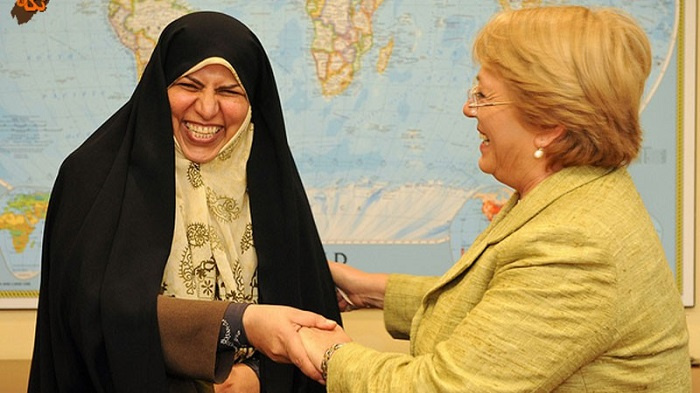Will Iran’s First-Ever Female Presidential Candidate Come from the Conservative Camp?

(Picture: Marzieh Vahid Dastjerdi with UN Women Executive Director Michelle Bachelet during the 67th UN General Assembly.)
Despite their reputation as conservatives or hardliners, Iranian Principlists, in all their diversity, have shown a knack for breaking long-held taboos of the Islamic Republic. Mahmoud Ahmadinejad was a pioneering politician in this regard. He was the first Iranian president to congratulate his American counterpart, in his case the newly-elected Barack Obama, on an occasion, after thirty years of hiatus in official correspondence between the officials of the two countries. He broke another, perhaps bigger, taboo in 2009, when he introduced three women as nominees for ministerial portfolios in his second cabinet, a move that even the progressive president Mohammad Khatami had not dared to take, in fear of strong reaction from powerful clerics in Qom, center of Iran’s religious seminaries.
From rumors circulating in the recent weeks, it seems that Mahmoud Ahmadinejad’s former supporters in the Principlist camp are floating the idea of advancing his taboo-breaking trend one step further, this time by introducing a woman for the presidential office, and that is Marzieh Vahid-Dastjerdi, Ahmadinejad’s only female candidate for ministry that secured the parliament’s vote of confidence in September 2009.
The Islamic Republic of Iran’s constitution has intentionally kept ambiguous about women’s right to run for the presidential office. The key point of legal debate is how to interpret the constitutional term ‘rajol’, Arabic word which can mean both ‘men’ and ‘personalities’, to either allow or bar women from presidential competition. The Guardian Council, the legal body responsible for qualifying candidates, rarely provides any explanations for its rejection of hopefuls. The fact that few female figures of those who have registered for candidacy have possessed a credible profile, has made their disqualification an easy task for the Council. Guardian Council Speaker Abbas-Ali Kadkhodaei’s response to questions about women’s candidacy entitlement has also left room for speculation. “There is no ban [for women] to register” Kadkhodaei said in early 2013, playing the subtle difference between registration and candidacy. Asked if women are regarded as political ‘rajol’, men/personalities, Kadkhodaei said the Council did not have discussions about the issue until then.
The Popular Front of Revolutionary Forces (PFRF), an embryonic alliance of a handful of Principlist figures, initiated rumors when in its inauguration ceremony, it introduced the former Minister of Health Marzieh Vahid-Dastjerdi, as its speaker.
If nominated, Marzieh Vahid-Dastjerdi will boast the highest profile among female candidate for the post. A legislator in the conservative-dominated 4th and 5th parliaments from 1991 to 1999, Vahid-Dastjerdi, an ob/gyn specialist, served in Ahmadinejad’s second cabinet as Minister of Health from 2009 to the last days of 2012, before her differences with the hard-to-work-with president led to her dismissal. At that time, it was said that her close relations with the Larijani brothers, particularly Bagher Larijani, her deputy at MoH, was the main reason behind her withdrawal from the cabinet.
A number of hardliners have reacted positively to the prospects of her candidacy for presidential office. Hossein Naghavi-Hosseini, legislator and a staunch critic of the government, has welcomed the idea of Marzieh Vahid-Dastjerdi’s nomination, emphasizing that the priority for Principlists should be priming a single candidate; a scenario intently followed by Principlists to avert recurrence of their embarrassing defeat in 2013 presidential election against Hassan Rouhani, when their entered the competition with multiple candidates.
It seems that Vahid-Dastjerdi’s candidacy, for its taboo-breaking effect, will be embraced by Reformists with open arms. In her interview with Shargh Daily, Parvaneh Salahshoori, Reformist MP from Tehran and head of women’s block in the parliament welcomed the likely candidacy of Marzieh Dastjerdi, calling her “an efficient manager” with a good track record, though arguing that she lacked the required charisma for presidency.
Nonetheless, if qualified by the Guardian Council, it remains a question if the Iranian society is ready to prioritize gender equality calls over concerns about economy and efficiency, and vote for Marzieh Vahid-Dastjerdi. “I follow my Reformist agenda. There is no reason for Reformists to support anyone but Rouhani” said Parvaneh Salahshoori when asked by Shargh if she would vote for the female Principlist candidate.

